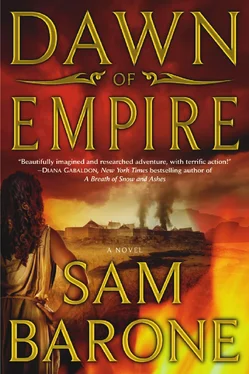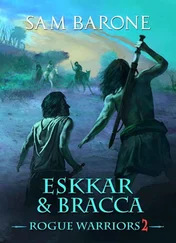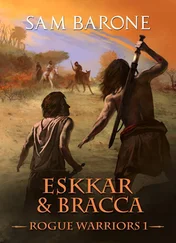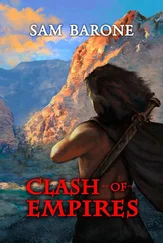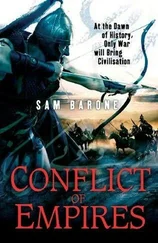Sam Barone - Dawn of Empire
Здесь есть возможность читать онлайн «Sam Barone - Dawn of Empire» весь текст электронной книги совершенно бесплатно (целиком полную версию без сокращений). В некоторых случаях можно слушать аудио, скачать через торрент в формате fb2 и присутствует краткое содержание. Жанр: Исторические приключения, на английском языке. Описание произведения, (предисловие) а так же отзывы посетителей доступны на портале библиотеки ЛибКат.
- Название:Dawn of Empire
- Автор:
- Жанр:
- Год:неизвестен
- ISBN:нет данных
- Рейтинг книги:4 / 5. Голосов: 1
-
Избранное:Добавить в избранное
- Отзывы:
-
Ваша оценка:
- 80
- 1
- 2
- 3
- 4
- 5
Dawn of Empire: краткое содержание, описание и аннотация
Предлагаем к чтению аннотацию, описание, краткое содержание или предисловие (зависит от того, что написал сам автор книги «Dawn of Empire»). Если вы не нашли необходимую информацию о книге — напишите в комментариях, мы постараемся отыскать её.
Dawn of Empire — читать онлайн бесплатно полную книгу (весь текст) целиком
Ниже представлен текст книги, разбитый по страницам. Система сохранения места последней прочитанной страницы, позволяет с удобством читать онлайн бесплатно книгу «Dawn of Empire», без необходимости каждый раз заново искать на чём Вы остановились. Поставьте закладку, и сможете в любой момент перейти на страницу, на которой закончили чтение.
Интервал:
Закладка:
Sam Barone
Dawn of Empire
Prologue
– The eastern bank of the river Tigris, 3158 B.C.E…
The village lay before him like a lamb trapped by a pack of wolves.
Thutmose — sin halted his sweat — soaked horse on the crest of the hill, while his men formed up on each side. He surveyed the plain beneath him, taking in the crops in the fields and the irrigation canals that watered them. His eyes soon fixed on the village barely two miles away.
There the Tigris curled sharply around the cluster of mud huts and tents that nestled against it. Today the river that brought the very sustenance of life to the dirt — eaters would be the obstacle that prevented their escape.
Those who hadn’t fled already, Thutmose — sin corrected himself. He had planned to catch the village by surprise, but word had preceded his band, as it so often did. The warriors had ridden hard for five days with little sleep. Despite that effort, the dirt — eaters had received a few hours’ warning. News of his approach must have traveled down the river, faster than a man on a horse. Even now, Thutmose — sin could see a few small boats paddling frantically to the far side of the Tigris. Those lucky ones would use the river to elude the fate he had planned for them.
His men had settled into place. Nearly three hundred warriors formed a single line across the hilltop, with Thutmose — sin at their center. Each man strung his bow, unslung his lance, and loosened the sword in his scabbard. They had done this so many times that now they spoke little and needed few commands, as they prepared themselves not for battle but for conquest. Only after the weapons were ready did they look to themselves.
Every rider drank deeply from his water skin, then emptied what remained over the head and neck of his horse. There would be plenty of water for both man and beast in the village.
His second in command, Rethnar, pulled up just behind him. “The men are ready, Thutmose — sin.”
The leader turned his head, saw the eagerness in Rethnar’s face, and smiled at the man’s excitement. Thutmose — sin looked left and right along the line, and saw that every tenth man had raised bow or lance into the air. The warriors were more than ready. Their reward for the days of hard riding awaited them. “Then let us begin.”
With a touch of his heel to the horse’s ribs, Thutmose — sin started the descent, the men following his lead. They took their time negotiating the downslope. With fresh horses, they would have raced down the incline and covered the last two miles in an exuberant rush. But after five days of riding, no man wanted to risk a valuable but weary horse-not with the end of their journey so near.
When they reached the plain, the line of horsemen became more ragged as the land flattened out. Small bands of riders detached themselves from the wings and began sweeping the countryside. They would search the outlying fields and scattered farmhouses, driving any inhabitants toward the village.
The main body of warriors cantered through fields of golden wheat and barley, Thutmose — sin at their head. They soon reached the broad, well — trodden path that led up to the village. Two minutes at a smooth gallop and they had passed the outermost dwellings.
Now the youngest warriors on the freshest horses took the lead, their war cries ringing over the thudding of the horses’ hooves. They rode past a few scattered dirt — eaters, ignoring the screaming women, frightened men, and crying children. A rough wooden fence as tall as a man might have slowed them for a moment, but the crude gate stood open and undefended. The warriors swept through unopposed.
Thutmose — sin saw the first dirt — eater die. An old man, stumbling in fear, tried to reach the safety of a hut. A warrior struck downward with his sword, then raised the now — bloodied blade high into the air and shouted his war cry. Arrows snapped from bows, striking down men and women caught in the open. The riders fanned out, some dismounting to search the huts, sword or lance in hand, looking for victims. Anyone who resisted would die, of course, but many would be killed just for the sport or to satisfy a thirst for blood. The rest would be spared. The Alur Meriki needed slaves, not bodies.
Thutmose — sin ignored the clamor as he rode slowly through the village, the ten members of his personal guard now surrounding him in the narrow lane. He saw that a few of the dwellings stood two stories tall, a display of their owner’s wealth and prestige. Some houses hid behind high mud walls, while others had small gardens setting them back from the lane.
He reached the gathering place at the heart of the village, a large open space with a wide stone well in its center. More than a dozen carts, their dirty linen awnings flapping in the light breeze, crowded the marketplace.
A few still had their wares upon them, though all stood deserted. A rich village, as his scouts had promised.
After a pause to let the horses drink some water from the well, Thutmose — sin picked out a wider lane that led toward the rear of the village. They followed its path until they reached the river. Here he halted, then slid easily to the ground, handing the halter to one of his men. A wooden dock extended a dozen paces into the Tigris. Walking to the jetty’s end, he tightened the wide strip of blue cloth embroidered with red thread that held his hair away from his eyes. Then he stopped and stared at the opposite bank.
Even at this fording place in midsummer, the Tigris reached nearly to the tops of its wide banks and flowed deeper than a man’s height in places.
A ferry provided passage to the other side, but the abandoned craft sat on the opposite bank, along with three smaller vessels, all empty. He noticed that the flat — sided ferry rested at an odd angle. Some dirt — eaters must have opened its bottom.
On the opposite shore, the land rose steeply into a hillside dotted with date palms and poplars. Thutmose — sin could see hundreds of people moving frantically up those slopes, some leading animals, others carrying their meager belongings, men helping their women and children. Most followed a crooked road that climbed toward a gap between the nearest hills. Almost all stole quick glances back toward the river, terrified that the grim riders would pursue them. The cowardly dirt — eaters would run as far as they could, for as long as they could, then hide in the rocks and caves, shaking with fear and praying to their feeble gods for deliverance from the Alur Meriki.
They’d slipped beyond his reach, and the knowledge enraged Thutmose — sin, though he kept his face emotionless. The tired horses didn’t have the strength to fight the current, let alone chase fleeing villagers, nor did they have the means to bring any captives or goods back to this side of the river.
He hated the Tigris, hated all rivers almost as much as he hated the dirt — eaters who dwelt beside them. The rivers with their boats that could travel farther and faster than a galloping horse while carrying men and their burdens. More important, the flowing waters gave life to villages abominations-such as this, and let them grow large and prosperous.
Thutmose — sin took a deep breath, then walked back up the jetty. Nothing showed of his disappointment. Thutmose — sin swung back onto his horse and led his bodyguards back into the village, where the captives’ la-ments rose to greet him. When he reached the well, Rethnar was waiting.
“Hail, Thutmose — sin. A fine village, isn’t it?”
“Hail, Rethnar.” Thutmose — sin answered formally, to affirm his authority. The two men were of much the same age, a few months under twenty — five, but Thutmose — sin commanded most of the men, and the clan’s sarrum, or king, had given him responsibility for the raid. The fact that the sarrum happened to be Thutmose — sin’s father made no difference in his authority.
Читать дальшеИнтервал:
Закладка:
Похожие книги на «Dawn of Empire»
Представляем Вашему вниманию похожие книги на «Dawn of Empire» списком для выбора. Мы отобрали схожую по названию и смыслу литературу в надежде предоставить читателям больше вариантов отыскать новые, интересные, ещё непрочитанные произведения.
Обсуждение, отзывы о книге «Dawn of Empire» и просто собственные мнения читателей. Оставьте ваши комментарии, напишите, что Вы думаете о произведении, его смысле или главных героях. Укажите что конкретно понравилось, а что нет, и почему Вы так считаете.
